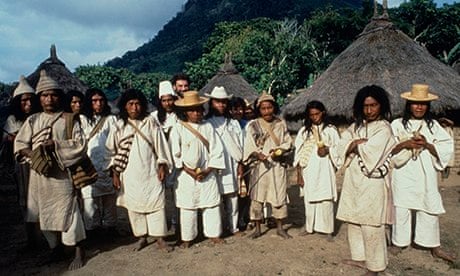Deep in Colombia's Sierra Nevada de Santa Marta mountains, surrounded by jungle (and guerrillas, tomb raiders and drug traffickers), live 20,000 indigenous Kogi people. A culturally intact pre-Colombian society, they've lived in seclusion since the Spanish conquest 500 years ago. Highly attuned to nature, the Kogi believe they exist to care for the world – a world they fear we are destroying.
In 1990, in a celebrated BBC documentary, the Kogi made contact with the outside world to warn industrialised societies of the potentially catastrophic future facing the planet if we don't change our ways.
They watched, waited and listened to nature. They witnessed landslides, floods, deforestation, the drying up of lakes and rivers, the stripping bare of mountain tops, the dying of trees. The Sierra Nevada, because of its unique ecological structure, mirrors the rest of the planet – bad news for us.
The Kogi don't understand why their words went unheeded, why people did not understand that the earth is a living body and if we damage part of it, we damage the whole body.
Twenty-three years later they summoned filmmaker Alan Ereira back to their home to renew the message: this time the leaders, the Kogi Mama (the name means enlightened ones), set out to show in a visceral way the delicate and critical interconnections that exist between the natural world.
The resulting film, Aluna, takes us into the world of the Kogi. At the heart of the tribe's belief system is "Aluna" – a kind of cosmic consciousness that is the source of all life and intelligence and the mind inside nature too. "Aluna is something that is thinking and has self-knowledge. It's self-aware and alive." says Ereira. "All indigenous people believe this, historically. It's absolutely universal."
Many Kogi Mama are raised in darkness for their formative years to learn to connect with this cosmic consciousness and, vitally, to respond to its needs in order to keep the world in balance. "Aluna needs the human mind to participate in the world – because the thing about a human mind is that it's in a body," explains Ereira. "Communicating with the cosmic mind is what a human being's job is as far as the Kogi are concerned."
The Kogi people believe that when time began the planet's 'mother' laid an invisible black thread linking special sites along the coast, which are, in turn, connected to locations in the mountains. What happens in one specific site is, they say, echoed in another miles away. Keen to illustrate this they devised a plan to lay a gold thread showing the connections that exist between special sites.
They want to show urgently that the damage caused by logging, mining, the building of power stations, roads and the construction of ports along the coast and at the mouths of rivers – in short expressions of global capitalism that result in the destruction of natural resources – affects what happens at the top of the mountain. Once white-capped peaks are now brown and bare, lakes are parched and the trees and vegetation vital to them are withering.
"The big thing in coastal development in this area is the 'mega-projects', especially the vast expansion of port facilities and associated extensive infrastructure to link new ports to large-scale coal and metals extraction and industrial plant such as aluminium smelters," says Ereira.
In a poignant scene in the film, CNN footage from September 2006 shows the Kogi walking for miles to protest against the draining of lagoons to make way for the construction of Puerta Brisa, a port to support Colombia's mining industry.
What happens at the river estuary affects what happens at the source, they say, over and over again. "The Kogi believe that the estuary provides evaporation that becomes deposited at the river source. So if you dry up the estuary you dry up the whole of the river source," says Ereira.
In the film, the views of the Kogi are backed up by a specialist in ecosystem restoration, a professor of zoology and a world leader in marine biology. "Along this stretch of coastline, you have a microcosm for what is happening in the Caribbean and also on the rest of the planet," says the latter, Alex Rogers, of Oxford University, on camera. "Their view that all these activities are having an impact at a larger scale are quite right."
It's not all doom and gloom: the Kogi end the film on a message of hope: don't abandon your lives, they say, just protect the rivers. But how to do that? One way forward is to engage the Kogi (and other indigenous communities who have an understanding of environmental impacts) in environmental assessment plans. The Tairona Heritage Trust has also been set up to support projects proposed by the Mamas. But Ereira stresses, "The Mamas are very clear about how we should take notice of what they say. Listen carefully, think, make our own decisions. They don't want to tell us what to do."
"I would hope that ordinary people will come away from the film feeling empowered to express what they already know – which is that the planet is alive and feels what we do to it," he says.
"Everybody who is a gardener in this country already has a Kogi relationship to the earth but they don't necessarily have a language to express that. They have an empathetic relationship to the land and what grows on it, and that empathy is what we have build on."
For more information visit the Aluna film website.
This content is brought to you by Guardian Professional. Become GSB member to get more stories like this direct to your inbox






Comments (…)
Sign in or create your Guardian account to join the discussion